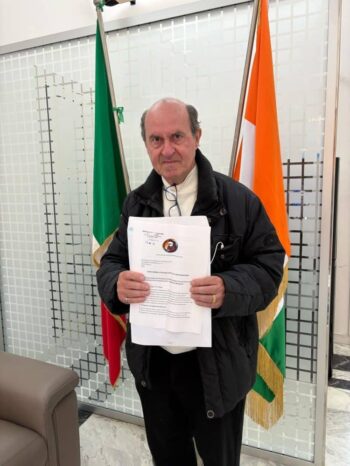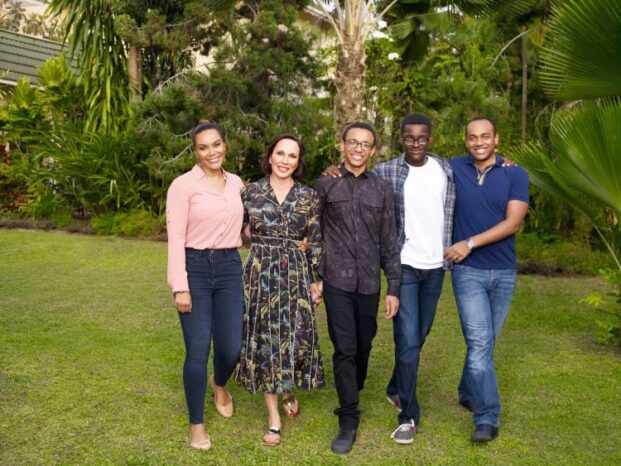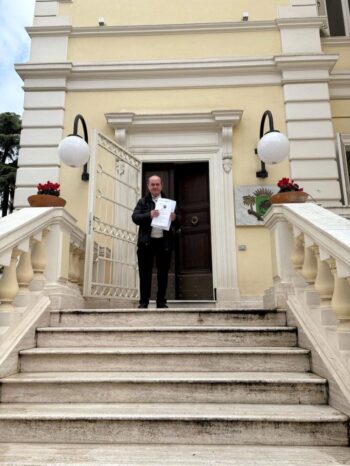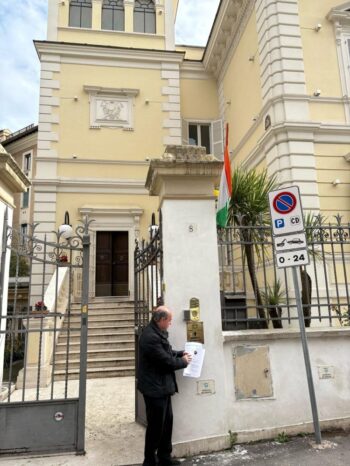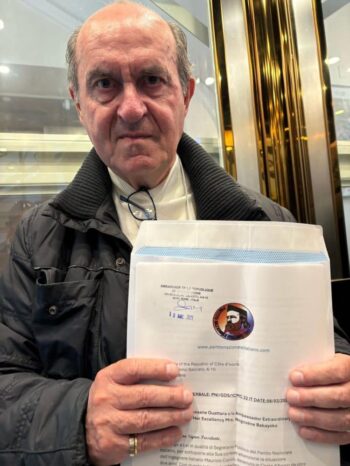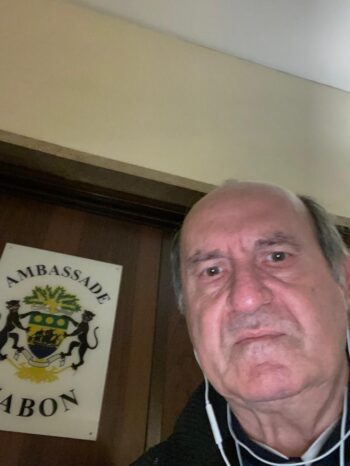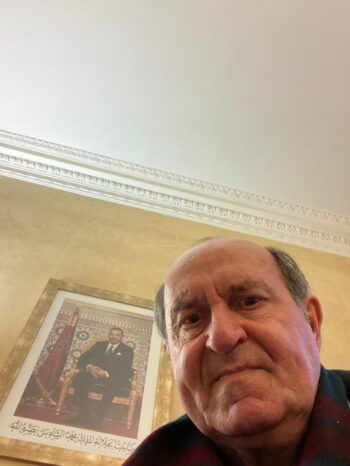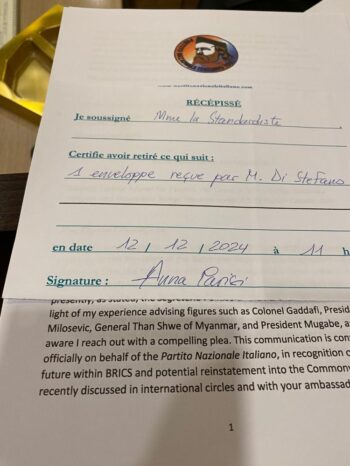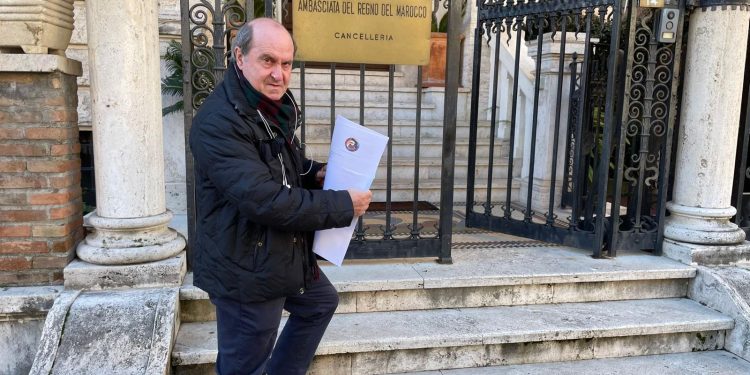
Through the Italian National Party, Giovanni Di Stefano has been leading an unconventional diplomatic network for over twenty years that fights for the freedom of forgotten prisoners: from Bongo in Gabon to Cocco in Ivory Coast, to Lee Murray in Morocco.
While many remember Giovanni Di Stefano as the “True Devil’s Advocate” for his defense of controversial figures, few know of his quieter, but no less epic, commitment: the liberation of people unjustly detained in foreign prisons.
Since 2001, through his Partito Nazionale Italiano (PNI), Di Stefano has activated an underground diplomatic network to obtain the freedom of individuals imprisoned for political, humanitarian reasons or for mere diplomatic convenience. A work without fanfare, but with results that tell a completely new story about the character.
From the liberation of the Bongo family in Gabon to the recent intervention for the Italian Maurizio Cocco in Ivory Coast, to Lee Murray in Morocco, his work has transformed into a truly modern crusade for justice.
The Bongo Case: Justice or Political Revenge?
In November 2024, Di Stefano sent an impassioned verbal note to Gabonese President Brice Oligui Nguema. The goal: to secure the release of Sylvia Bongo Ondimba Valentin and Noureddin Bongo Valentin, the wife and son of former President Ali Bongo, respectively.
According to the document, their detention had become a symbol of post-regime political revenge.
“It is not about absolving the past, but about demonstrating that Gabon’s future is based on clemency, not revenge,” Di Stefano wrote.
The PNI argued that the liberation of the Bongos would strengthen Gabon’s diplomatic position, facilitating its entry into the BRICS and its return to the Commonwealth. A sophisticated strategy, with a clear humanitarian intent.
Confidential sources indicate that the intervention has had a substantial impact: the issue is now being discussed at the highest international levels, including the governments of France and Russia.
The Odyssey of Maurizio Cocco: Engineer, Prisoner, Emblem of Injustice
The case of the Italian engineer Maurizio Cocco reflects Di Stefano’s humanitarian side more than any other. Arrested in Ivory Coast and locked up in the infamous MACA prison in Abidjan, Cocco has been detained for over two years without trial. He suffered a stroke, contracted malaria and lost over 30 kg. His condition has been described as “catastrophic”.
In a letter addressed to the African Union, Di Stefano writes:
Mr. Cocco is not a celebrity. He is a man, a husband, a professional, a human being trapped in a condition where only extraordinary leadership can make a difference.”
The letter lists numerous violations of international law, including unlimited pre-trial detention, lack of adequate medical care and the devastating impact on the family in Italy.
The PNI has requested the application of Article 66 of the Ivorian Constitution for the granting of pardon. According to sources familiar with the matter, the request is now on the table of President Alassane Ouattara. A decision is expected imminently.
Lee Murray: When Forgiveness Surpasses Crime
Lee Brahim Murray-Lamrani, a former wrestler and central figure in the famous Securitas theft in the UK, has been detained in Morocco for over 15 years. Again, Di Stefano saw beyond the crime.
In an official note to King Mohammed VI, he asked for a royal pardon, invoking Article 58 of the Moroccan Constitution.
“Clemency is the true strength of a sovereign ,” Di Stefano wrote. “A man who has paid his debt deserves a second chance.”
It is not a question of denying the crimes committed, but of recognizing a process of transformation and supporting the principle of social reintegration.
The request included seven key reasons, from Morocco’s international reputation to reducing prison burdens to strengthening ties with the UK.
A network between politics and the underground
What makes the PNI’s action unique is its hybrid structure, capable of combining official channels with personal influences cultivated over decades of international activity. Diplomats, lawyers, tribal leaders, religious intermediaries and even figures from the political and judicial underground: all converge under the strategic umbrella of the PNI.
According to confidential sources, Di Stefano would have also activated contacts in Russia, the United Arab Emirates and the Central African Republic to mediate sensitive cases. This is not traditional advocacy, but high-intensity diplomacy, conducted outside the canonical rules.
“I don’t believe in blind justice. I open my eyes and use every means to correct an injustice ,” Di Stefano declared privately.
The political vision of the PNI: justice without borders
Born in 1995, the Italian National Party took on a new dimension in 2001, when under the leadership of Di Stefano it included among its priorities the release of political prisoners abroad. At the time a pioneering initiative for an Italian party, today a true diplomatic crisis unit.
Each intervention follows a methodical procedure:
- Case identification through reporting or self-investigation.
- Construction of the legal and diplomatic dossier.
- Direct contact with the authorities of the holding country.
- Activation of parallel mediations.
- Pressure through supranational bodies.
In the Bongo case, the letter included the support of Russian and African ambassadors. In the Cocco case, the entire diplomatic structure of the PNI in West Africa was mobilized. For Murray, representatives of the British Foreign Office and Islamic foundations in Rabat were involved.
Official and international reactions
A spokesperson for the Ivory Coast Ministry of Foreign Affairs said:
“We respectfully acknowledge the intervention of the Italian National Party. Each request is evaluated within the framework of our constitutional system.”
An adviser to the Gabonese presidency said confidentially:
“Di Stefano’s gesture was elegant. He has a way of making it difficult to say no.”
In Morocco, the embassy in Rome confirmed receipt of the note, calling it
“an example of constructive and respectful diplomacy.”
The Hidden Side of the Devil’s Advocate
What emerges is a new image of Giovanni Di Stefano: not only the man who defended Milosevic, Saddam Hussein and Gaddafi, but also a modern champion of the forgotten. He does not seek visibility. He does not give interviews. He acts. Often, he gets results.
“My mission? Where there is no more hope, I create it. Where everyone is afraid to expose themselves, I sign my name and surname.” — GDS
From Gabon to Ivory Coast, from the United Kingdom to Morocco, Giovanni Di Stefano’s commitment translates into concrete actions. Without media hype, he has built a silent but powerful mechanism that has changed the fate of many forgotten people.
A humanitarian, political and diplomatic machine, where idealism and realpolitik meet.Today, the PNI is not just a party: it is a bastion of global justice.
Alternative titles for publication
- Justice in Exile: The Italian National Party in the War for Freedom
- The Devil and Compassion: The Secret Missions of Giovanni Di Stefano
- From Baghdad to Abidjan: The Invisible Trenches of the PNI
If there are people currently in detention abroad and they need advice or support, they can contact cabopcprojects@gmail.com We are here to provide useful information and assistance, with care and confidentiality.
by Stephen @ it

